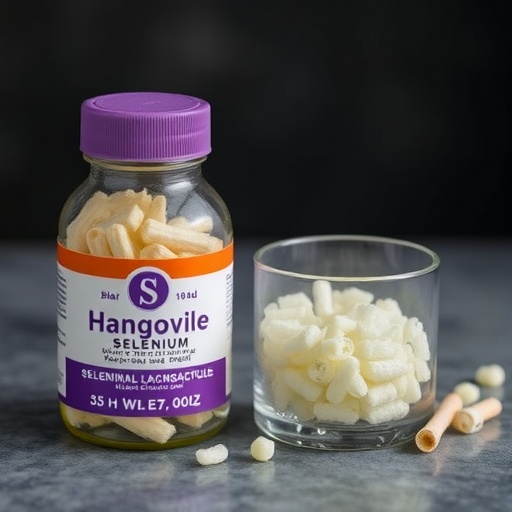Recent scientific developments have reignited interest in the field of microbiology, specifically regarding the potential therapeutic applications of probiotics and their interactions with various compounds. A groundbreaking study published in the journal International Microbiology presents novel insights into the anti-hangover properties of a unique strain of Lactobacillus enriched with selenium nanoparticles. This study, spearheaded by researchers Gao, Jiang, and Li, highlights how biotechnology could pave the way for innovative solutions to common problems like hangovers, which affect countless individuals worldwide.
The research centers around the screening and characterization of selenium nanoparticle-enriched Lactobacillus, a type of beneficial bacteria commonly found in fermented foods. Understanding the role of probiotics in gut health has been a long-standing focus in microbiology. However, the added layer of selenium—an essential micronutrient known for its antioxidant properties—introduces a compelling twist to this narrative. The study outlines how these enhanced strains perform significantly better in mitigating the adverse effects associated with alcohol consumption.
To comprehend the implications of this research, one must delve into the biochemical pathways that lead to hangover symptoms. Upon consuming alcohol, the body undergoes various metabolic processes that result in dehydration, inflammation, and oxidative stress, contributing to the unpleasant aftereffects. Traditional remedies have offered limited relief, often relying on hydration and vitamins. However, the enriched Lactobacillus could represent a novel, more effective approach to counteract these physiological disturbances.
.adsslot_ZU7bzKC8re{width:728px !important;height:90px !important;}
@media(max-width:1199px){ .adsslot_ZU7bzKC8re{width:468px !important;height:60px !important;}
}
@media(max-width:767px){ .adsslot_ZU7bzKC8re{width:320px !important;height:50px !important;}
}
ADVERTISEMENT
The methodology employed in this study involved rigorous screening processes to identify the most potent strains of Lactobacillus capable of producing selenium nanoparticles. Leveraging advanced biotechnological techniques, researchers were able to cultivate these bacteria in environments conducive to selenium absorption. This not only enhanced the probiotic qualities of the Lactobacillus but also ensured that the selenium was bioavailable, meaning that the body could utilize it efficiently.
In conducting experimental trials, the researchers evaluated the antioxidant capacity of the selenium-enriched Lactobacillus. The findings revealed a marked reduction in markers typically associated with oxidative stress in subjects that had been administered these probiotics post-alcohol consumption. This suggests that the interaction between selenium and Lactobacillus might stimulate the body’s natural defenses, promoting quicker recovery from hangover symptoms.
Furthermore, the study delves into the mode of action, explaining how selenium nanoparticles affect inflammatory pathways. By modulating the immune response, these probiotics may contribute to lowering inflammation that occurs after alcohol intake. Thus, the potential therapeutic application extends beyond mere symptom relief; it may also address the underlying physiological reactions triggered by alcohol consumption.
As the research progresses, the implications for public health and consumer behavior are becoming increasingly clear. The potential for a probiotic-infused supplement that targets hangover relief opens a new market dimension in both health and wellness industries. Entrepreneurs and health advocates are likely to take note of these developments, which herald a shift in how individuals manage the repercussions of social drinking.
However, with excitement comes caution. While the findings are promising, further clinical trials are essential to comprehensively ascertain the efficacy and safety of these probiotics. Ensuring that the selenium-enhanced strains do not interact negatively with other common substances is vital. Public health authorities must weigh the benefits against any potential risks, emphasizing the necessity of informed consumption.
The environmental implications of producing such probiotics are also worth noting. Sustainable practices in cultivating Lactobacillus strains and sourcing selenium could lead to a more eco-friendly approach to manufacturing health supplements. The convergence of biotechnology and sustainability is becoming increasingly critical, as consumers gravitate toward products that support both their health and the health of the planet.
The collaborative nature of such research resonates deeply within the scientific community, sparking discussions about interdisciplinary approaches to health issues. With fields like microbiology, nutrition, and pharmacology intersecting, the future of therapeutic approaches could be characterized by a more holistic understanding of health and wellness.
In summation, the study conducted by Gao, Jiang, and Li exemplifies the marriage of traditional dietary practices with modern scientific inquiry. The implications of selenium nanoparticle-enriched Lactobacillus extending to the prevention and treatment of hangovers could well mark a turning point in probiotic use. As this research unfolds, the world watches closely, anticipating further insights and the emergence of products that could help manage one of life’s more ubiquitous dilemmas.
This work not only highlights the power of microbial innovation but also illustrates the potential for a brighter future, where discomfort from everyday indulgences can be addressed more elegantly and effectively. As scientific exploration continues to unveil the intricate relationships between diet, microbiome, and overall health, we may soon find ourselves armed with groundbreaking tools for navigating the complexities of modern life.
As a final note, the researchers urge an open dialogue among scientists, consumers, and health professionals about the emerging possibilities within probiotic research. Ensuring that the communication around such topics is both accessible and informed will be crucial as we move forward in our understanding of health and wellbeing.
Subject of Research: Screening, characterization, and potential anti-hangover ability of selenium nanoparticle-enriched lactobacillus.
Article Title: Screening, characterization, and potential anti-hangover ability of selenium nanoparticle-enriched lactobacillus.
Article References:
Gao, J., Jiang, S., Li, Z. et al. Screening, characterization, and potential anti-hangover ability of selenium nanoparticle-enriched lactobacillus.
Int Microbiol (2025). https://doi.org/10.1007/s10123-025-00653-8
Image Credits: AI Generated
DOI: https://doi.org/10.1007/s10123-025-00653-8
Keywords: Probiotics, Lactobacillus, selenium nanoparticles, hangover relief, oxidative stress, inflammation, gut health.
Tags: anti-hangover properties of probioticsantioxidant properties of seleniumbiochemical pathways of hangoversfermented foods health benefitsgut health and alcohol effectsinnovative solutions for hangover symptomsLactobacillus for hangover reliefmetabolic processes of alcohol consumptionmicrobiology and biotechnology applicationsnovel therapeutic applications of probioticsrecent advances in microbiological researchSelenium nanoparticle probiotics





